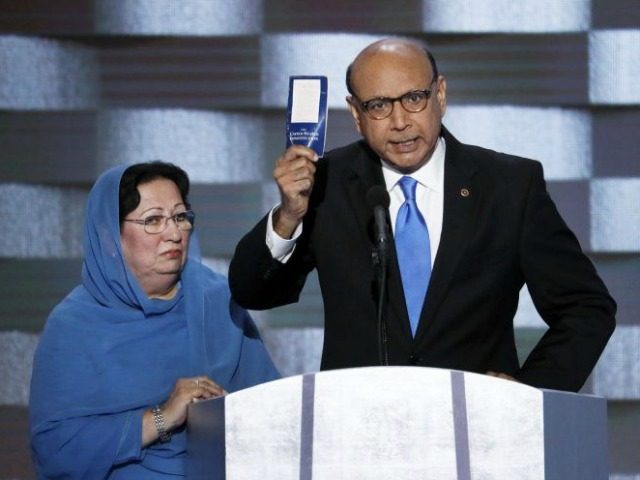FBI agent Peter Strzok testified before the U.S. House of Representatives on Thursday that he did not remember sending his lover, then-FBI lawyer Lisa Page, a text message about stopping Donald Trump from becoming president — but that he had been referring to the Khizr Khan controversy.
However, Strzok’s claim is contradicted by the report of the Office of the Inspector General of the U.S. Department of Justice into the FBI’s handling of the investigation into Hillary Clinton’s emails.
Khan addressed the Democratic National Convention in Philadelphia on July 28, 2016, and attacked Trump’s policies on immigration, citing his son Humayun, a Muslim U.S. Army soldier killed in action in Iraq. His wife stood silently by his side, wearing a traditional headscarf.
Two days later, ABC News’ George Stephanopoulos, a former staffer for President Bill Clinton, asked Trump about Khan’s comments during an interview. Trump said that Khan “probably looked like a nice guy to me” but speculated that Khan’s wife “maybe … wasn’t allowed to have anything to say.”
That response was interpreted as an attack on a Gold Star family.
At Thursday’s hearing, Strzok was asked about a text message exchange with Page on Aug. 8, 2016, in which she said, “[Trump’s] not ever going to become president, right? Right?!” Strzok replied: “No. No he’s not. We’ll stop it.”
Strzok said he did not remember sending that text, but testified that the context had been the Khizr Khan controversy:
Sir, I think it’s important, when you look at those texts, that you understand the context in which they were made, and the things that were going on across America. In terms of the texts that, “We will stop it.” You need to understand that was written late at night, off the cuff, and it was in response to a series of events that included then-candidate Trump insulting the immigrant family of a fallen war hero. And my presumption based, on that horrible, disgusting behavior, that the American population would not somebody demonstrating that behavior to be President of the United States. It was in no way, unequivocally, that me, the FBI, would take any action whatsoever to improperly impact the electoral process for any candidate.
Strzok: My Anti-Trump Text Was Based On His ‘Horrible, Disgusting’ Treatment Of Gold Star Family pic.twitter.com/BK8slU9tMl
— TPM Livewire (@TPMLiveWire) July 12, 2018
While Strzok sought to use the Khizr Khan controversy to justify his text on Aug. 8, the Inspector General’s report on the FBI’s investigation tells a different story about Strzok’s reaction to events at the time.
The report notes that Page texted Strzok two days earlier about Khizr Khan, on Aug. 6, and sent him another article about Republicans standing up to Trump. She noted that she believed Strzok may have been placed his position at the FBI because he was “meant to protect the country from that menace.”
The Inspector General’s report noted: “Strzok told us that he did not interpret Page’s reference to ‘protect the country from that menace’ to refer to Trump.”
Strzok told the Inspector General: “I take menace a little differently. I take, I take the menace as, again, I view any foreign interference with our electoral process to be a threat, to be a violation of law…. So when I see menace, I, you know, is that Trump, is that Russian interference, is it the combination of the two?”
He did not mention any outrage about Trump’s remarks regarding Khan. Nor did his response to Page mention Khan: “Thanks. It’s absolutely true that we’re both very fortunate. And of course I’ll try and approach it that way. I just know it will be tough at times. I can protect our country at many levels, not sure if that helps….”.
It is not clear what Strzok meant by being able to “protect our country at many levels.”
Two days later, on Aug. 8, Strzok sent Page the text message about stopping Trump from becoming president.
When the Inspector General asked Strzok about that message, he did not mention Khizr Khan at all.
The report notes: “When asked about this text message, Strzok stated that he did not specifically recall sending it, but that he believed that it was intended to reassure Page that Trump would not be elected, not to suggest that he would do something to impact the investigation.”
It is possible that Khan was on Strzok’s mind, as it was a matter of intense political debate at the time. But he never mentioned Khan to Page and never mentioned Khan to the Inspector General. And the “context” of his Aug. 8 text to Page about stopping Trump would appear to have been his earlier discussions about protecting the country from Trump, or from Russia, or both.
Joel B. Pollak is Senior Editor-at-Large at Breitbart News. He is a winner of the 2018 Robert Novak Journalism Alumni Fellowship. He is also the co-author of How Trump Won: The Inside Story of a Revolution, which is available from Regnery. Follow him on Twitter at @joelpollak.

COMMENTS
Please let us know if you're having issues with commenting.